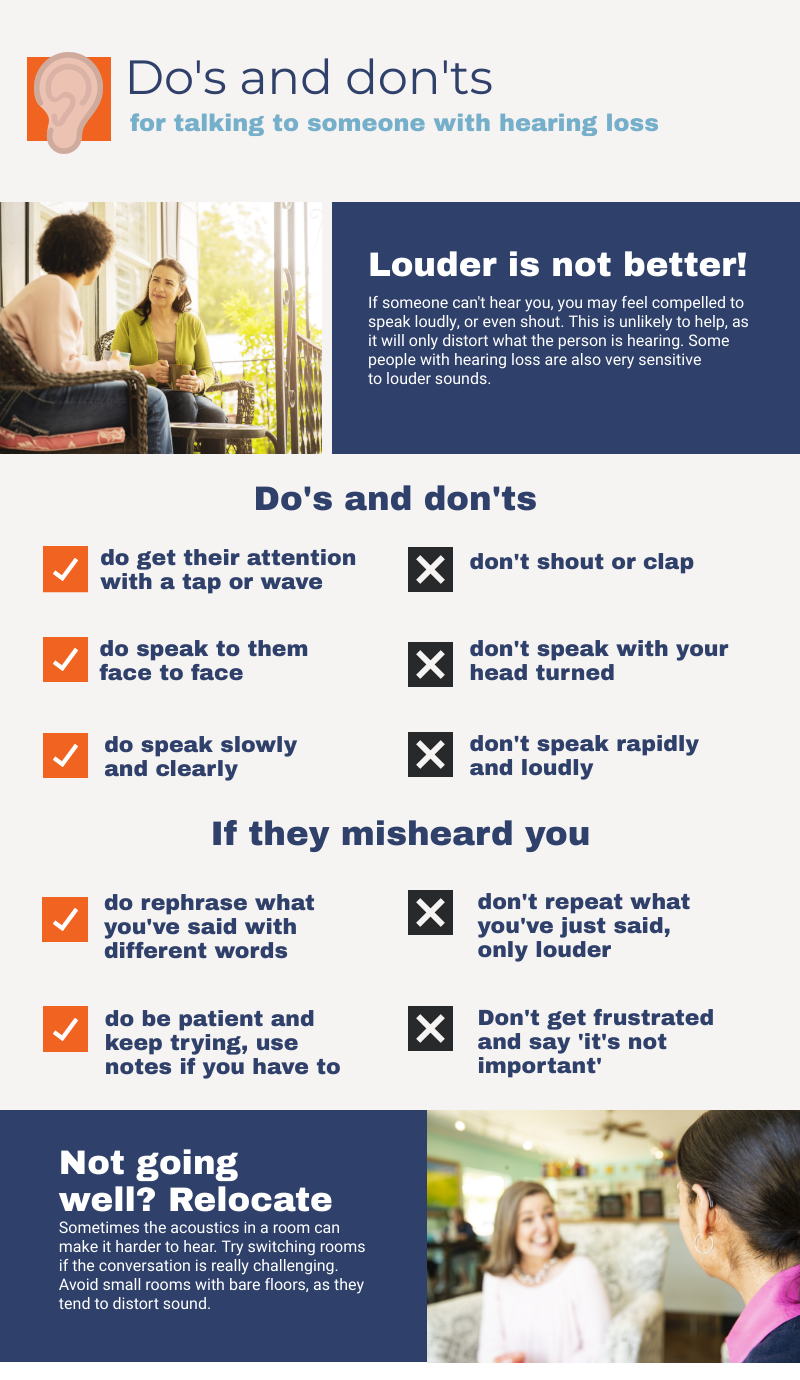If your spouse, friend, or coworker has hearing loss, there are plenty of ways to help him or her cope and thrive. Here's how to provide support to someone with hearing loss:
Learn what it's like to live with hearing loss

increase your patience.
It's well known—and maybe you've experienced it—that hearing loss can put a strain on relationships, causing stress, hurt feelings and frustration over miscommunication. If you sometimes get frustrated, one good thing to do is learn more about what hearing loss is like. Having empathy and being able to relate to what your loved one or friend is experiencing with hearing loss may help increase your patience.
Besides having a good conversation in which you ask questions to better understand their experience, you can use technology to learn even more. Several websites will simulate what it's like to have hearing loss so you can get a clear picture of what the world sounds like for a person with hearing loss.
Speak up for your loved one (if it's OK with them)
One thing you can do to show your support is to be an advocate for your loved one with hearing loss. For example, it can be especially difficult for a person with hearing loss to hear in group situations, whether it's at a dinner or party, due to the background noise. Before a family gathering, you can call or email the other relatives to let them know some tips and tactics to help foster more successful communication with the family member with hearing loss. At dinner, you can make sure to sit next to that person and let him or her know that if a punch line is missed, he or she can turn to you to get the missed information. On a more general level, you can be an advocate for those with hearing loss. For example, if you stay at a hotel, you can check in to see if they provide services and rooms equipped for people who are hard of hearing. If they do not, you can suggest this to management. Of course, only do these things after you've talked to your loved one and they're OK with it.
But don't overdo it
While it's important for you to show empathy for your partner, be wary that you can over-do it and start compensating for your partner. If your loved one has untreated hearing loss and you find yourself constantly having to "translate" (explaining to them what they misheard), you may be compensating for them. Although you're trying to be helpful, in the long run, compensating can be harmful to both of you and lead to resentment.
Do's and don'ts for talking to someone with hearing loss
When someone has hearing loss, oral communication, a vital function of participating in society and relationships, is negatively affected. But remember, effective communication goes far beyond spoken words. Gestures and facial expressions enhance the meaning of the message.
Whenever possible, face the person when talking, keep your mouth uncovered and gently get his or her attention before beginning a conversation. Do not chew gum while talking because it distorts the shape of your mouth making lipreading more difficult. Your friend may have extra difficulty hearing when he or she is stressed, tired, upset or sick. Be flexible in having conversations until there's a better time.

Additional tips:
- Rephrase rather than repeat what you said. Sometimes it will be easier for the person to understand if you choose different words that are easier to hear.
- Move to a different environment—one with less background noise or better lighting.
- Use simple sentences rather than complex ones which can be hard to follow.
- Make sure to speak clearly and slowly and at a natural volume. If you raise your voice too much, it might be more difficult for your spouse to hear and understand since the sound can be distorted.
- Try an assistive listening device, like a personal amplifier.
- Provide your friend with the key word of what you said—write it down or spell it if necessary.
- Don't get frustrated and say, "Never mind, it's not important." This can make a person with hearing loss feel worse.
- Patience goes a long way. Do your best to laugh off any miscommunications.
More: What if it's your spouse who has hearing loss but isn't ready to admit they need help? Here's how to talk to your spouse about hearing loss.
Attend hearing care appointments
If the person is your spouse or a close loved one, lend your support by being involved in their hearing care appointments. Not only will this show how much you care about their hearing, but it will also give you a chance to ask the hearing care professional questions about their hearing loss. You can help by writing down vital information and sharing your observations about your loved one's hearing loss and its effects with the hearing care professional.
Suggest auditory rehabilitation
Family members impacted by hearing loss may want to look into auditory training or aural rehabilitation for their loved one. This is a series of classes that focuses on improving communication for people adjusting to hearing aids and cochlear implants or just for those who are living with hearing loss. Aural rehabilitation can:
- Help people adjust to a family member's hearing loss, including providing communication tips and counseling.
- Assist people with hearing loss in interpreting visual cues and improve lipreading skills.
- Provide people with tips for handling challenging conversations.
- Educate someone with hearing loss on his or her legal rights to accommodations in the workplace and in academic environments.
- Help people learn how to listen again with cochlear implants and hearing aids.
More on living well with hearing loss:
- Your home's acoustics may be making it harder to hear
- How to hear better in even the most challenging places (like a crowded restaurant)
- How to tell your parents they need hearing aids
If you are the one in the partnership with hearing loss, your personal relationship will benefit greatly when you take the first step toward better hearing.
Better hearing isn't just a gift you give yourself, but the better communication will bring joy to your spouse or partner, too. Find a hearing aid center near you and make the call today.
The above is the interpretation of How to Support a Loved One with Hearing Loss provided by Chinese hearing aid supplier Shenrui Medical. Link https://www.srmcm.com/Blog/How_to_Support_a_Loved_One_with_Hearing_Loss.html of this article is welcome to share and forward. For more hearing aid related information, please visit Blog or take a look at our Hearing aids products















